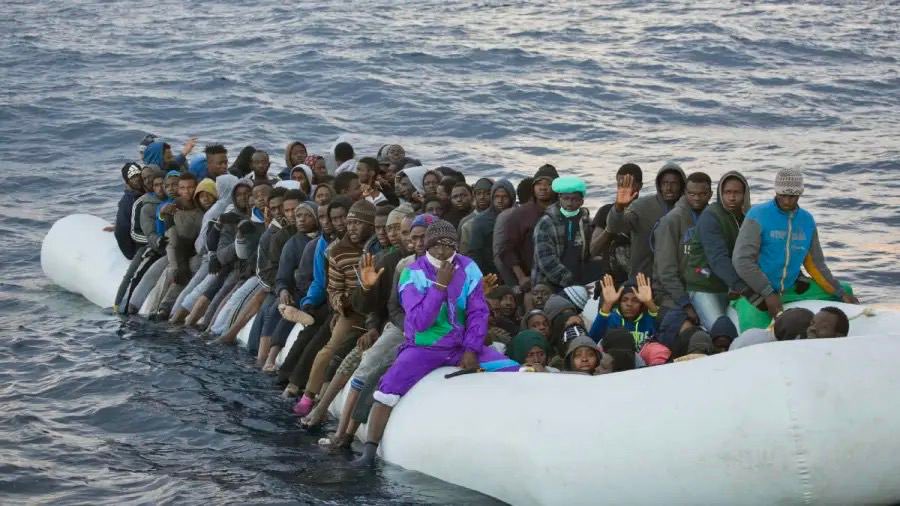

African migrants (Photo: Twitter/@Mousacisse1)
European countries have tied themselves up in knots over trying to keep migrants out.
The European Union (EU) signed a “strategic and comprehensive partnership” agreement with north African nation Tunisia last week in which it will give $1.1 billion as aid in return for Tunisia tightening its borders and battling migration to Europe. The deal is supposed to provide climate change help as well as stabilise economy in the country.
Tunisia is a major route for migrants and refugees planning to travel to EU nations. The deal takes place at a time when Europe is facing record migration levels as well as boat drownings that are killing hundreds of people at sea.
The architects of the agreement are President Ursula Von der Leyen, Dutch Prime Minister Mark Rutte, and Italian Prime Minister Giorgia Meloni, who travelled earlier this month to Tunisia to discuss the deal with Tunisian President Kais Saied.
President Saied is leading a nation that is on the verge of an economic collapse, waiting for a bailout from international institutions. The 2011 revolution upstaged the economy, followed by militant attacks in 2015, the Covid-19 pandemic in 2020 and drought.
Even as Leyen, Rutte and Meloni trumpet their deal as a path-breaker for European nations to tackle the flow of migrants into their countries, it has been criticised by human rights organisations. The agreement has come under fire for its support to President Saied who has allegedly fostered a non-democratic environment in his country. The deal is also being condemned for blocking routes to migrants and denying asylum-seekers the right to scout for refuge.
The UK too has been jumping from one possible solution to another possible solution to stem the tide of boat landings and illegal immigrants flowing into the country. Most of those ideas have been rubbished by human rights advocates.
The government has estimated that nearly 45,000 people arrived in 1,053 small boats in the UK in just one year.
In one of its latest actions to hold the asylum seekers, the British government has rented out a huge engineless barge, called Bibby Stockholm, where it plans to accommodate 500 men seeking asylum in the UK. Applications for asylum will be processed while the men stay on the barge.
The barge has been towed to Portland Port in Dorset and has been retrofitted as a hotel with cabins, en-suite bathrooms, bunk-beds, corridors, common areas, prayer rooms, dining rooms, a gym and other spaces.
The barge, which has facilities for food as well as health, has often been compared to a floating prison. Besides inviting disapproval from various quarters over living conditions, cramped quarters and not treating vulnerable people with dignity, the local residents too are not enthusiastic about so many men being too close for comfort.
The barge scheme is the second controversial policy by the British government to manage migrants. The earlier one – flying off asylum seekers to Rwanda in central-east Africa, was struck down by a British court as unlawful. In June this year, the court said that Rwanda could not be considered a safe third country for migrants to be deported from the UK.
Britain’s Rwandan policy has been met with opprobrium right from the start, when former prime minister Boris Johnson had ushered in the idea.
The court even said that there existed a high possibility that the asylum seekers might be deported to their own countries from Rwanda where they might face persecution.
Europe and the UK have been battling, rather unsuccessfully, migration as well as assimilation issues as refugees stream into Europe from conflict and poverty-ridden zones in Africa and Asia. The end of the Afghan war in 2021 exacerbated the crisis as Afghans, fearful of Taliban vengeance, fled across the world, as far as Brazil, US and Canada.
Highlighting the use of indigenous platforms during Operation Sindoor, Chief of Defence Staff (CDS) General…
Congress MP Shashi Tharoor on Friday (local time) said that Colombia will issue a statement…
Minister for Electronics and Information Technology Ashwini Vaishnaw said on Friday that the government is…
Renowned human rights activist and political analyst Amjad Ayub Mirza has expressed a strong denunciation…
As was widely expected, the Indian economy grew by 6.5 per cent in real terms…
World No Tobacco Day, marked annually on 31 May, addresses a major public health challenge--the…